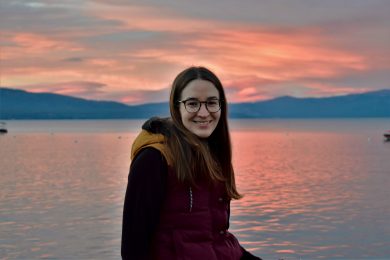Graduate Profile: Margaret Kroll, Linguistics Doctoral Candidate

Margaret Kroll is a sixth-year PhD Candidate in the Linguistics program at UC Santa Cruz and the recipient of a 2019-2020 THI Summer Research Fellowship. Her work in the linguistic subfield of pragmatics uses interdisciplinary methods to examine the ways that parts of language are interpreted based on the context in which they are spoken or used.
The Humanities Institute caught up with Kroll this month to get more insight into her research, and to discuss how she is finding hope for change in this current moment. She also shared the highlights of her time here at UC Santa Cruz as she looks ahead to her graduation in June.
You were awarded a THI Summer Research Fellowship for your project: “A Matter of Perspective: Constructing Meaning and Truth.” Congratulations! For the non-linguists among us, could you tell us what this project is about?
Thank you! I am grateful to The Humanities Institute for its support. Humans are, so far as we know, unique in their ability to communicate through language. It’s amazing if you stop and think about it, our ability to effortlessly understand and produce chains of words that are organized in incredibly complex and infinitely diverse patterns. In fact, the rules of natural language are so complex that modern linguistics — born during the cognitive revolution of the 1950’s — still has not mapped them all.
It’s amazing if you stop and think about it, our ability to effortlessly understand and produce chains of words that are organized in incredibly complex and infinitely diverse patterns.
My research in general looks at how our construction of hierarchical mental representations of discourse originate both from formal properties of our language system and from our performative interactions with other language-users. My dissertation probes these hierarchical representations by focusing on our interpretations of parts of language that have no inherent meaning and instead get their meaning from context, like the words ‘she’, ‘it’, and ‘that’. For example, what does the pronoun ‘she’ mean in the following two sentences?
(a) Rose adores Donna because she is outspoken.
(b) Rose impresses Donna because she is outspoken.
Most people interpret the pronouns as ‘Donna’ in (a), but ‘Rose’ in (b). My dissertation works within the linguistic subfield of pragmatics, the interdisciplinary attempt to understand how we understand what a given utterance or text means based not only on the literal meaning of what is said, but also on accounts of human behavior that include a speaker’s intentions and goals. I argue that our interpretive differences, such as those invoked in the examples above, provide insight into profound and fundamental notions of how people organize information. Thus, by looking at how people interpret pronouns, we can probe a deeper question: how people take a running sequence of words in a text or discourse and from them construct a complex internal narrative.
What did you use the THI fellowship support towards this summer? Any research trips or special projects?

The fellowship money allowed me to run experiments on crowdsourcing platforms over the summer. I like to use experimental methodologies because they allow me to gather linguistic patterns representing people of different ages, ethnicities, genders, geographic location, and socioeconomic status. By engaging with multiple participants, experimentation is an inclusive method that ensures the story I tell is ultimately one that has been influenced by a diverse population and is not representative only of a narrow group. I also presented part of this research at a conference in Scotland (as my pictures show)!
What stage in your graduate career are you at at UC Santa Cruz?
I am in my final year at UCSC and am graduating in June.
That’s great to hear! How much of a role has your department played in your academic development during your time here? Can you tell us about your day-to-day work life in the linguistics department?

I am fortunate to be part of an active and engaged department. As a PhD student, I wear three hats: researcher, student, and teacher. As a researcher, I am managing projects, running experiments, writing papers, publishing, and presenting at conferences. As a teacher, I am invested in the department’s undergraduate program and students as a teaching assistant/fellow and by offering research assistantships. As a student, I am constantly learning new theories and skills through coursework, reading groups, and independent study. For example, in my third year of the program I decided I wanted to learn psycholinguistics, an entirely new subfield for me. Thankfully, my department gave me the resources and the flexibility to do this, and I was able to combine two subfields into a novel approach for my dissertation research.
That sounds fantastic. Taking a wider view: what have been the highlights of your time at UC Santa Cruz so far? What have been some of the challenges you’ve worked through?

The highlight of my time at UC Santa Cruz is the people I’ve met along the journey. I am forever grateful to the friends, colleagues, and teachers I have come to know here. It is logistically and financially difficult to live in Santa Cruz as a graduate student, and it is one of the biggest challenges I know facing most of my colleagues. I’ve worked through this by taking on additional jobs outside the university, and by being fortunate enough to have a family that I can rely on for support.
This has obviously been a very strange quarter so far in terms of the global Covid-19 pandemic. How has the crisis changed the way you are thinking about your academic life and daily life right now? What do you do to try to stay focused and stay sane? If you have any tips for your fellow graduate students, we’d love to hear them.
I stay sane by remembering that science and critical thinking can overcome ideologically driven propaganda, and that there is hope for change.
This has been a challenging year for students, faculty, and staff at the University. I believe it has highlighted more than ever the importance of humanistic theory in the organization of our everyday lives. Local and global events have raised questions about what it means to have a free and just society, what our individual responsibilities are in protecting this way of life, and about the critical role that equal access to education plays in it. I stay sane by remembering that science and critical thinking can overcome ideologically driven propaganda, and that there is hope for change. I am grateful to be surrounded by people who are willing to work to achieve that.
